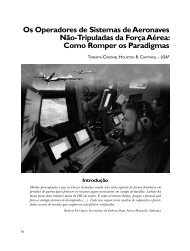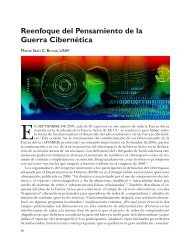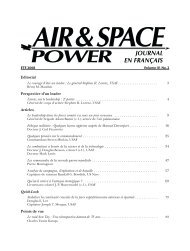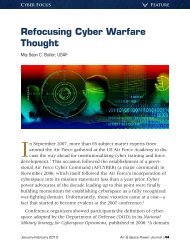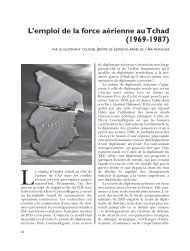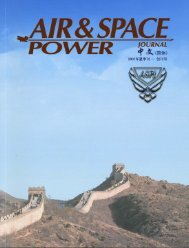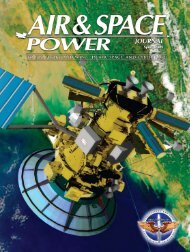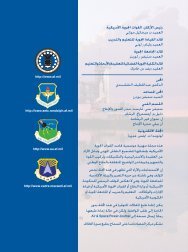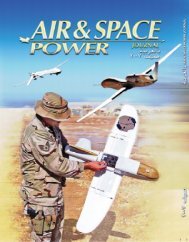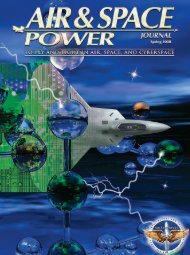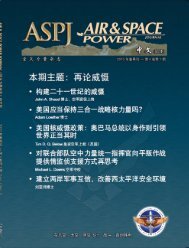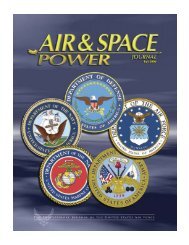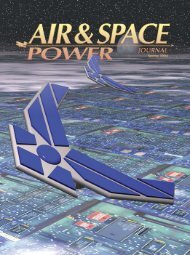Carta ao AFRICOM No. 1 - Air & Space Power Chronicle
Carta ao AFRICOM No. 1 - Air & Space Power Chronicle
Carta ao AFRICOM No. 1 - Air & Space Power Chronicle
Create successful ePaper yourself
Turn your PDF publications into a flip-book with our unique Google optimized e-Paper software.
44 AIR & SPACE POWER JOURNALgajamento de forças armadas, militar-militar,o <strong>AFRICOM</strong> deve estar indissoluvelmente vinculado<strong>ao</strong>s processos interagenciais e em coordenaçãocom todos os elementos do governonacional para assessorar os africanos aidentificar e traduzir práticas de gestão de recursosdentro de seu contexto cultural, reduzindoo conflito e mantendo a paz. ❏<strong>No</strong>tas1. Joint Publication (JP) 3.0, Joint Operations, 17 setembro2006 (incorporando a emenda 1, 13 fevereiro2008), III-30 to III-36, http://www.dtic.mil/doctrine/new_pubs/jp3_0.pdf.2. Ver ibid., V-5 to V-6, para a seguinte descrição deestabilidade de operações:Joint force planning and operations conducted priorto commencement of hostilities should establish asound foundation for operations in the “stabilize” and“enable civil authority” phases. [Joint force commanders]should anticipate and address how to fill thepower vacuum created when sustained combat operationswind down. Accomplishing this task should easethe transition to operations in the “stabilize” phaseand shorten the path to the national strategic endstate and handover to another authority.Considerations include:(a) Limiting the damage to key infrastructure andservices.(b) Establishing the intended disposition of capturedleadership and demobilized military and paramilitaryforces.(c) Providing for the availability of cash.(d) Identifying and managing potential “stabilize”phase enemies.(e) Determining the proper force mix (e.g., combat,military police, [Civil Affairs], engineer, medical,multinational).(f) Availability of [host nation] law enforcement and[human support services] resources.(g) Securing key infrastructure nodes and facilitating[host nation] law enforcement and first responderservices.(h) Developing and disseminating [strategic communication]themes to suppress potential new enemiesand promote new governmental authority.3. “[Joint force commanders] must integrate and synchronizestability operations—missions, tasks, and activitiesto maintain or reestablish a safe and secure environmentand provide essential governmental services,emergency infrastructure reconstruction, or humanitarianrelief—with offensive and defensive operations withineach major operation or campaign phase. Planningfor stability operations should begin when joint operationplanning is initiated.” Ibid., xxi.4. US <strong>Air</strong> Force, “Current Issues,” apresentação em<strong>Power</strong>Point, Curtis E. LeMay Center for Doctrine Developmentand Education, <strong>Air</strong> University, Maxwell AFB, AL, 2009.5. Walter Pincus, “Pentagon Recommends ‘Whole-of-Government’ National Security Plans,” Washington Post,2 fevereiro 2009, http://www.washingtonpost.com/wp-dyn/content/article/2009/02/01/AR2009020101964.html.6. Conway, James, Gary Roughead, e Thad Allen, CooperativeStrategy for 21st Century Seapower, Washington DCDepartamento de Defesa, outubro 2007, 4, http://www.navy.mil/maritime/.7. Amnesty International, Democratic Republic of Congo:Making a Killing: The Diamond Trade in Government-ControlledDRC (London: Amnesty International Publications, 21outubro 2002), http://www.amnesty.org/en/library/asset/AFR62/017/2002/en/9303f3ef-d7cd-11dd-b4cd-01eb52042454/afr620172002en.html.8. Amnesty International, Nigeria: Petroleum, Pollutionand Poverty in the Niger Delta (London: Amnesty InternationalPublications, 2009), https://www-secure.amnesty.org/en/library/info/AFR44/017/2009/en.9. Hugo Slim, “By What Authority? The Legitimacyand Accountability of <strong>No</strong>n-governmental Organisations”(International Council on Human Rights Policy InternationalMeeting on Global Trends and Human Rights—Before and After September 11, Genebra, Suiça, 10–12janeiro 2002), http://www.jha.ac/articles/a082.htm.10. Matthew Todd Bradley, “Civil Society and DemocraticProgression in Postcolonial Nigeria: The Role of<strong>No</strong>n-Governmental Organizations,” Journal of Civil Society1, no. 1 (maio 2005), 62.11. Amnesty International, Nigeria, 28-30.12. Kent Hughes Butts and Arthur L. Bradshaw Jr.,eds., Central African Security: Conflict in the Congo: Proceedings:September 18–19, 2001 (Carlisle, PA: Center for StrategicLeadership, US Army War College, 2002), http://handle.dtic.mil/100.2/ADA423517; and Chen-I Lin andAllison Schuster, “Hydroelectricity Investment in the DemocraticRepublic of the Congo—The Grand Inga” (Medford,MA: Tufts University, 2008), http://wikis.uit.tufts.edu/confluence/display/aquapedia/Hydroelectricty+Investment+in+the+Democratic+Republic+of+the+Congo+-+The+Grand+Inga.13. “Evolution in a Vortex: An Inventory of the Fishesand Mollusks of the Lower Congo River Rapids,” MUSSELL



